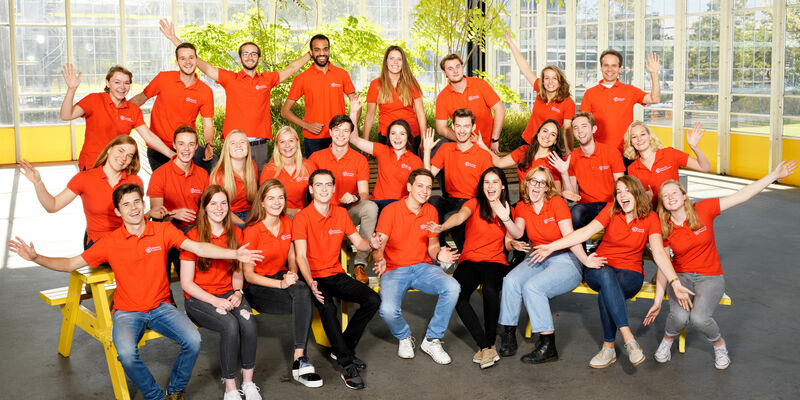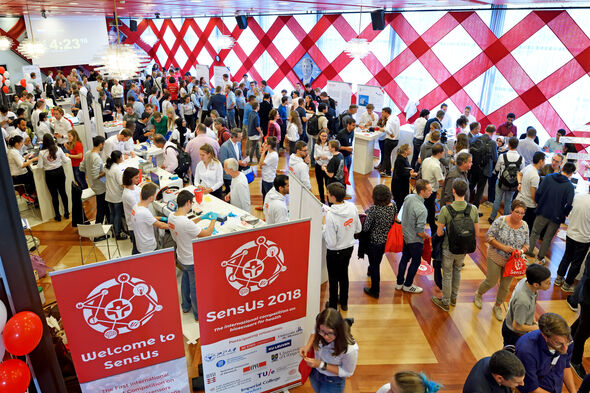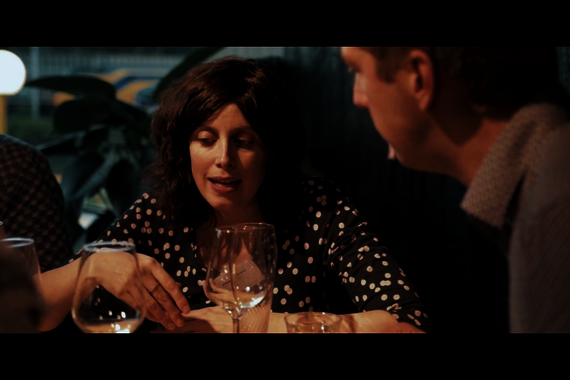
- The University , Student
- 29/04/2019
SensUs becomes twelfth TU/e student team
SensUs was founded over four years ago but it will only now join the club of TU/e student teams. Before long SensUs will be signing a contract with the Executive Board, and with that SensUs will officially become the twelfth student team of TU/e and will receive funding from the university.
The nature of SensUs is twofold. First there is the annual competition on biosensors at TU/e. Sixteen university teams from four continents will take part in September, including a TU/e team operating under the name T.E.S.T.
Then there is the organization behind the competition. This group of students is responsible for everything that takes place behind the scenes, and builds a global network in order to accelerate the development of sensors for better healthcare. Their diligence did not pass unnoticed by the board. The university wants to support the progress of the healthcare project by officially acknowledging the organizers as a student team.
That is noteworthy because until now, all student teams had been working on the design and improvement of a product or a procedure. Think of sustainable, autonomous vehicles, drones, self-sustaining homes, robots, energy storage or single-cell organisms. SensUs is different because the team doesn’t build a tangible product but an ecosystem. A global platform where students, alumni, universities and business companies share knowledge.
Recognition
Tamar van Asch and Isabel van der Steenhoven are part of the ‘behind the scenes’ team of SensUs. They had to "keep hammering" for recognition. “We don’t make a concrete product. We do build an online platform that accelerates and maximizes socially beneficial implementations of biosensors all year round. We did have to prove it to the executive board first. We succeeded eventually, and we are proud of that,” Van Asch says.
The participation of SensUs in TU/e innovation Space at the end of 2018 helped expedite matters. Van Asch: “The core team of innovation Space led by Alfons Bruekers has many connections within TU/e and is very knowledgeable. We also received tips from other student teams such as Solid. Sacha Claessens of the Communications Expertise Center and Mia Jelsma of Strategic Areas were very helpful as well.”
Financing
SensUs will receive financing starting next academic year. The exact amount is still unclear. Van der Steenhoven: “TU/e has one fund for all student teams. Every team receives an annual amount, based on the budget they submit. You have to show what you need the money for, how you intend to spend it, and what the consequences will be if you do not receive the requested amount in full.”
TU/e’s financial support came in time. During the first few years, SensUs received funding from the European organization EIT Health. Van der Steenhoven: “They act as a kind of springboard and mostly finance the start. Now they’re gradually scaling down their contribution.” The new student team will look into other sources, such as companies or other partners, of financing.
Read on beneath the photo.
Ecosystem
The ecosystem has gained momentum like a snowball that continues to grow as it hurtles down a slope. It consists of the international teams that take part in the annual competition at TU/e. Fourteen universities with professors and research groups are involved so far. The online platform also brings together healthcare organizations, consultancy firms, commercial partners, companies and former participants.
Read on beneath the video.
Van Asch: “Once the platform is completed and has a strong online presence, preliminary rounds may take place in other countries, but the main competition will surely stay in Eindhoven during the next few years. We’ve noticed that commercial parties are seriously interested in our competition and platform because it accelerates technological developments and helps patients. A student team is able to build a protype in nine months that could sometimes take the industry years to develop.”
“We had some considerable successes during the last four years," Van der Steenhoven says. "Some teams have published their research, and some other teams wish to grow into a startup. We expect to see more initiatives and the presence of biosensors on the market when we bring everyone into contact.”
Recruiting new members
SensUs has 26 team members at this point. Some of them will leave in a few months’ time when this year’s competition is over. Van Asch: “We’re still looking for new team members for next academic year. We strive for a gradual flow. SensUs started as an Honors Academy track, which usually lasts two years. That leads to a nice overlapping structure. One half leaves after a year, the other half continues together with a new generation. We try to let the new members take part starting in the fourth quartile. That way they can experience the lead up to the competition and, more importantly, the event itself, and they won’t have to start from zero in September.”
SensUs strives for the widest possible range of disciplines. Students from every possible program are welcome. Van Asch says that SensUs gives everybody the opportunity to develop new ideas. "And you learn soft skills, such as presentation, communication and organization. It takes much longer to acquire these skills in a lecture hall than in a student team. SensUs is a special organization because we are open to the personal development of team members. We give a great deal of feedback amongst ourselves and feel personally involved with each other. That is very valuable.”
If you are interested in meeting SensUs, or thinking about becoming a member, you can contact the student team here.


Discussion